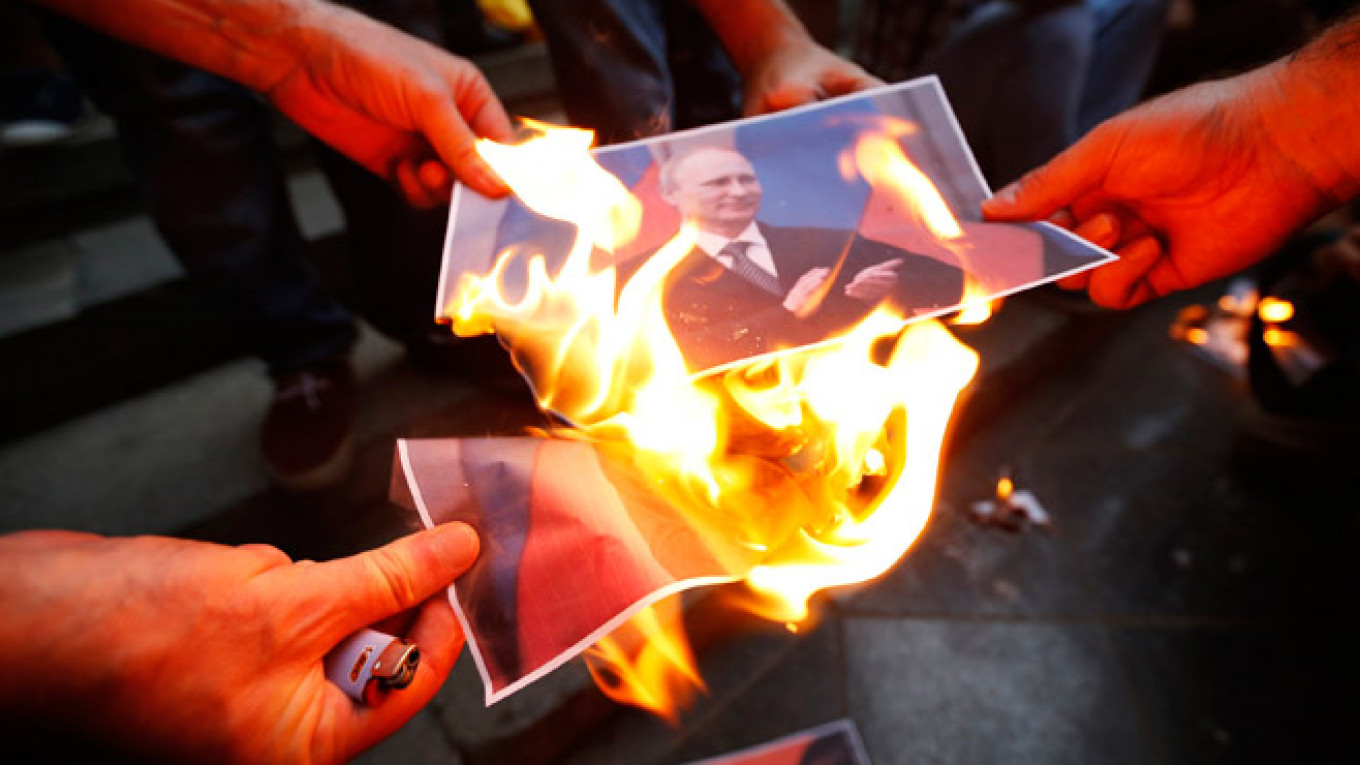Many outsiders look at the situation in Russia and wonder why a majority of citizens still enthusiastically support President Vladimir Putin. To the West's surprise, Russians don't seem to be worried about things like sanctions, increased capital flight or international isolation.
Kremlin cheerleaders and their propagandists might triumphantly proclaim that this is genuine patriotism, and that the Russian people will gladly make sacrifices for the sake of the nation.
However, this would only sound convincing to people who have never spent time in Russia, or perhaps to those who are simply out of touch with Russian reality. The real truth is that the many citizens judge their country's greatness not by its quality of life but by other, more ephemeral, criteria.
A common theme in Russian political discourse is summed up by the phrase "Russia, raised from its knees." Typically it is used by supporters of Putin, who will claim that he raised Russia from its knees, or that he was raising it, or that he will raise it, or whatever they need to claim at the moment.
What Russia on its knees looks like isn't difficult to understand: We need only look at the disastrous 1990s. The problem is, nobody ever gave much thought to what Russia standing up should look like, and those who have hold dangerously unrealistic notions of what this means.
In their mind, sanctions, capital flight, and economics in general won't be a problem: They will just cut Russia off from the West, and of course it is the West that is responsible for all Russia's woes. Then Russia will flourish because it has lots of resources, territory, and of course tanks and airplanes. This all sounds great if your understanding of world politics is defined largely by movies and video games. But in the real world, that attitude simply doesn't work.
So why do so many of Russia's leaders believe that the answer to Russia's problems involves becoming a military power and projecting that power around the world?
The answer lies in the fact that many Russians seem to think of a nation's greatness only in terms of power. From widespread nostalgia for the Soviet Union to overwhelming support for Crimea's annexation, a menacing, even aggressive state is viewed as praiseworthy.
The idea that Russia could be great and powerful by seriously reducing corruption, improving state services, building infrastructure, and generally increasing the standard of living for its citizens, does not seem to occur to Russia's leadership. Instead, they dismiss countries with vastly superior standards of living such as Sweden and Switzerland, because these countries don't have empires or nuclear weapons.
Westerners might look at this and point fingers without realizing the role our own nations played in this state of affairs. Very little care, if any at all, was taken in helping Russia transition to a functioning capitalist economy with a democratic system.
Still, many Western journalists berate Russians for their inability to grasp certain liberal ideas, without considering whether or not these ideas were ever properly explained in Russia. Many Westerners also fail to realize that such liberal values appeared suddenly during a time of great social upheaval and suffering, creating an association in the minds of many Russians which may be illogical, but is entirely understandable.
But Russia is not fated to walk down this path forever. Other nations, such as Germany and Japan, have recovered from far worse catastrophes, and managed to succeed in the modern world.
What Russia needs is a reality check. The Kremlin runs a capitalist country in a capitalist world, and it needs to learn to live with that. It needs to learn to compete in that world, to take care of its own citizens first and foremost. But until that happens, until people grow up and start living in the real world, there will be little hope for the future.
James Kovpak is the founder of the blog Russia Without BS.
A Message from The Moscow Times:
Dear readers,
We are facing unprecedented challenges. Russia's Prosecutor General's Office has designated The Moscow Times as an "undesirable" organization, criminalizing our work and putting our staff at risk of prosecution. This follows our earlier unjust labeling as a "foreign agent."
These actions are direct attempts to silence independent journalism in Russia. The authorities claim our work "discredits the decisions of the Russian leadership." We see things differently: we strive to provide accurate, unbiased reporting on Russia.
We, the journalists of The Moscow Times, refuse to be silenced. But to continue our work, we need your help.
Your support, no matter how small, makes a world of difference. If you can, please support us monthly starting from just $2. It's quick to set up, and every contribution makes a significant impact.
By supporting The Moscow Times, you're defending open, independent journalism in the face of repression. Thank you for standing with us.
Remind me later.






